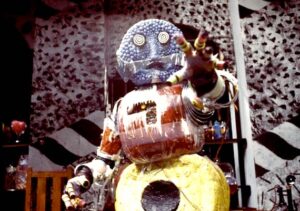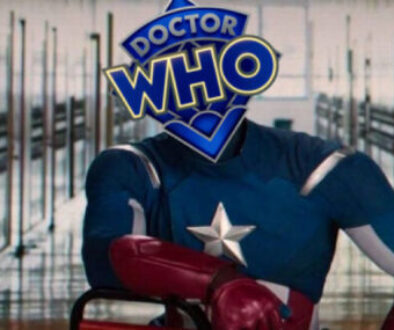How Doctor Who Can Secure its Future
Guest contributor George Edgington examines.

All good things come to an end. All classic Doctor Who fans can sympathise with this notion after the bad news of its long hiatus from 1989. When the show made a triumphant return to television screens in 2005, fans were ecstatic. Since then the show has come on leaps and bounds, and its popularity had grown considerably. Though how long can this last? Will the BBC once again decide in a decade or more that the show has had it’s time? With the 50th anniversary fast approaching I wanted to take a long at some of the things the showrunners can do to secure the longevity of the show, after all, none of us what another dark age without that borrowed blue box.
A Story Worth Telling
 There seems to be this tendency with some episodes of Doctor Who, episodes made just because the writer or head writer thought it would make a good episode. Take ‘The Rings of Akhaten’ for example, an episode made because Moffat wanted to show a ‘proper alien planet’, and because the episode came from the idea of just doing something ‘cool’ there wasn’t really any thought out story behind it, and it suffered the wrath of many Whovians. Though I quite liked this episode for what it was.
There seems to be this tendency with some episodes of Doctor Who, episodes made just because the writer or head writer thought it would make a good episode. Take ‘The Rings of Akhaten’ for example, an episode made because Moffat wanted to show a ‘proper alien planet’, and because the episode came from the idea of just doing something ‘cool’ there wasn’t really any thought out story behind it, and it suffered the wrath of many Whovians. Though I quite liked this episode for what it was.
‘Victory of the Daleks’ is also a good example of an episode from an idea. “Winston Churchill and the Daleks” was the brief given to writer Mark Gatiss by Moffat. Where’s the story in that? Where is the thought? In fairness, it should be the writer who decides the story, but at the same time the head writer should have more of a say in the story. If you give a writer a sentence brief with no real content you aren’t going to get the episode that you were expecting.
Two episodes, which use this idea brief from the head writer well, are ‘Doomsday’ and ‘Journey to the Centre of the TARDIS’. Both these episodes come with a simple fan pleasing idea: Daleks Vs Cybermen for ‘Doomsday’, and what else is in the TARDIS? for ‘Journey to the Centre of the TARDIS’. The difference with these episodes is that they followed through with a story worth telling, and a story that fans would appreciate.
This shows that it can work, just giving a writer a brief of a sentence can be done well on the show, if the episode is one that is worth the 45 minutes and not just crammed with filler plot points.
Make It Count
Fourteen episodes is quite a large amount compared to other UK television dramas, which means we get quite a bit of the Doctor and his adventures, though this isn’t necessarily a good thing. The thing with shows of six to eight episodes per series is that they have less episodes to focus on and more opportunity to make sure that each episode counts with a good and proper story.
Doctor Who is lucky in the sense that it’s a national treasure, though this doesn’t secure its stay on our television screens. New shows or shows only into their second or third series have the task of keeping audience watching and intrigued with the plots. Doctor Who has a history of 50 years, so it’s got a good track record, but episodes aren’t counting.
 There are several reasons why Doctor who suffered in the late 80’s, one of these was the stories. They became partly silly, and over the top, the writers took fans for granted and just assumed that ‘It’s Doctor Who? People will just watch for that!’ This really isn’t the case.
There are several reasons why Doctor who suffered in the late 80’s, one of these was the stories. They became partly silly, and over the top, the writers took fans for granted and just assumed that ‘It’s Doctor Who? People will just watch for that!’ This really isn’t the case.
Television has become more mature; its audiences are expecting something with a bit of meat to it. Doctor Who is at the end of the day a family show, but if kids have the choice of Peter Kay absorbing people or a beautiful sunny day on the beach, I think you can see what they’d choose.
Moffat and his team need to ensure that episodes are being made with something that is going to make audiences tune in each week. Make sure that is an adventure from start to finish. If it means we get a few less episodes a series, then so be it. I’d rather eight to ten episodes of Doctor Who with a set of stories that count and are excited, rather than fourteen episodes (including Christmas) that range from the amazing to the down right dull.
Don’t Waste A Good Monster
 Remember the Empty Child? Or that unseen creature from Midnight? Of course you do! These were monsters used to their fullest and put into an episode for a reason. The same however cannot be said for the likes of the Smilers, the Vigil, the Macra (of Gridlock) or, even at a stretch, the Reapers (Who were amazing and creepy but just took a backseat to a story about Rose).
Remember the Empty Child? Or that unseen creature from Midnight? Of course you do! These were monsters used to their fullest and put into an episode for a reason. The same however cannot be said for the likes of the Smilers, the Vigil, the Macra (of Gridlock) or, even at a stretch, the Reapers (Who were amazing and creepy but just took a backseat to a story about Rose).
Okay, maybe the Reapers weren’t the best example, but the Smilers, the Vigil and the Macra and others of the new Doctor Who series are just there for filler. If the production team are going spend time creating a creature (which is kind of their job) you’d hope that there was some fitting story for it. Monsters like the Peg Dolls from ‘Night Terrors’ were somewhat wasted on a good opportunity: a potentially creepy and scary monster that just didn’t have that feel to it.
These monsters should be ones that kids can’t wait to get their hands on a toy of, which most are, though they won’t do if we see the monster for all of five minutes (the Vigil anyone?)
A good Doctor Who monster should be there for a purpose, and a good one at that. Not something that’s just there because the episode requires a bit-part monster.
In Conclusion
These are just some of thoughts I had about what could the showrunners do to secure this show for another ten years at least. These three points are ones that keep coming up with fans when they talk about the disappointment of an episode: A weak story, a episode that could’ve been so much more, and a monster that just didn’t live up to its full potential.
Though as fans we should be proud, this is a show that has lasted 50 years, through the good the bad and the downright bizarre. And okay, some episodes may not meet our expectations, but does it really matter? We watch the show because we love it. As with every show, there are the episodes that you find a little less up to scratch than usual, but we shouldn’t complain, we should support.
I for one thoroughly enjoyed Series 7, more than I have any other series. Admittedly, there were a couple of episodes that haven’t been full marks, though at the end of the day this hasn’t spoiled my enjoyment of the series in the slightest. Just with the way fans sometimes negatively speak of the show, and the lowered viewing overnight figures, a Whovian can’t help but worry we’re going back to 1989.








